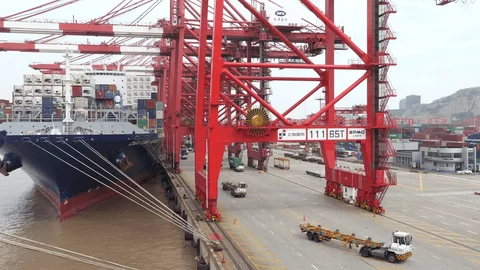China has begun granting some U.S. imports exemptions from its 125% tariffs, signaling a potential easing of tensions in the ongoing trade dispute with the United States.
The move, which comes after statements from the U.S. suggesting a thaw in relations, could be seen as an effort by Beijing to de-escalate the trade conflict that has disrupted much of the trade between the two nations and sparked concerns of a global recession.
The exemptions have led to a slight increase in the value of the U.S. dollar and boosted equity markets in Hong Kong and Japan. Business groups are optimistic that these exemptions might extend to various industries, providing relief to companies reliant on U.S. imports.
However, despite the exemption moves, Beijing has not publicly confirmed the details or the extent of the tariff exemptions.
U.S. President Donald Trump confirmed in an interview with TIME magazine that there have been talks between the two countries regarding tariffs, mentioning that Chinese President Xi Jinping had called him. Although Beijing has disputed this characterization of the discussions, Trump indicated that the two leaders had communicated, though he did not provide specific details about the timing or content of the conversation.
Meanwhile, a statement from China’s Politburo underscored the country’s efforts to stabilize its domestic economy by supporting businesses and workers most affected by tariffs. The government appears ready to endure the economic strain caused by the trade war, preparing for the possibility of a long-term conflict with the U.S.
The Ministry of Commerce in China has been actively collecting lists of goods that could be exempted from tariffs and is asking companies to submit requests. The ministry also held discussions with over 80 foreign companies and business chambers in China to gauge the impact of U.S. tariffs on investment and business operations.
One example of how the exemptions are taking shape includes some U.S. pharmaceutical companies, which have reported being able to import certain drugs to China without tariffs. Similarly, Safran, a French aerospace company, confirmed receiving tariff exemptions on key components such as engines and landing gear.
A circulating list of potential tariff-exempted products, including pharmaceuticals, chemicals, and aerospace components, has been circulating on social media and among trade groups, though it has not been verified. This list is said to include goods worth $45 billion based on 2024 import data, but official confirmation from China’s customs agency and Ministry of Commerce has not been provided.
While Washington has shown willingness to negotiate tariff exemptions, particularly for some electronic goods, China has maintained its position, stating that it is prepared to continue the trade fight unless the U.S. lifts its tariffs. Despite China’s significant trade surplus, its economy faces challenges such as rising unemployment and deflationary pressures, which have been exacerbated by the trade war.
Certain critical U.S. imports, such as ethane used in plastics production and certain pharmaceuticals, are essential to China’s manufacturing processes. Companies in the chemical and pharmaceutical industries have already sought tariff waivers, given that the U.S. is the sole supplier of some of these key imports.
This ongoing trade battle continues to create uncertainties for global markets, with both nations navigating the complexities of a protracted trade war.




